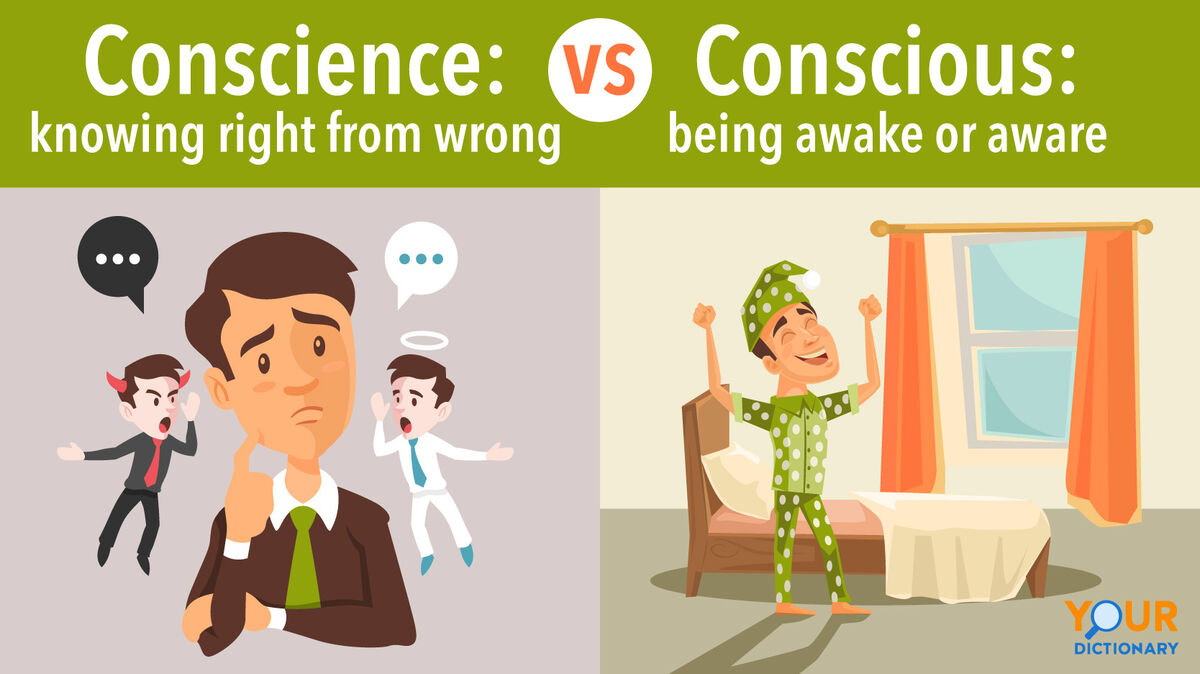
Using correct grammar can help you become a more conscious writer — and it's good for your conscience, too! These words are often confused because they sound so similar. Although they both involve the mind, conscience and conscious have different grammatical and psychological meanings that writers should know.
Should I Use Conscience or Conscious?
While these words come from the Latin root consire, which means "the awareness of guilt", there's a slight difference in pronunciation between conscience (CON-shence) and conscious (CON-shus). But the biggest difference between these words is their meanings.
| Word | Meaning | Example |
| conscience | sense of right and wrong | My conscience told me that this was the wrong decision. |
conscious | being awake or aware | The patient was conscious a few hours after the surgery. |
Conscience Meaning: Knowing Right From Wrong
The word conscience is a noun that describes one's ability to tell if an action is morally right or wrong. Psychoanalyst Sigmund Freud believed that the conscience is part of the superego, which contains your value system.
Examples of consciences from movies and cartoons include:
- Jiminy Cricket from Pinocchio (1940), the loyal cricket friend who helps Pinocchio with his moral decisions
- the angel and the devil on cartoon characters' shoulders who try to convince a character to act in certain ways
- a character's voiceover reminding him or herself not to do something
Examples of Conscience in a Sentence
You'll typically see the word conscious used as a noun, usually after a possessive noun or adjective. Examples of conscience in a sentence include:
- The truth was nagging at my conscience, so I confessed to cheating on the test.
- Make the right decision according to your conscience.
- Kendra almost went along with the plan, but her conscience told her that it was wrong.
A common English idiom is "in good conscience," meaning that you're doing something because you think it's right. For example:
- We can't in good conscience support his re-election.
- Are you acting in good conscience?
- Shirley made the difficult decision in good conscience.
Conscious Meaning: Being Awake
Conscious is an adjective that describes one as awake or alert. It's the other part of Freud's psychoanalytic theory that refers to one's ability to process the world around them. You'll find conscious in the following common words:
- unconscious - not awake or not aware
- subconscious - a motivation beneath one's awareness
- semiconscious - partly awake
- self-conscious - overly concerned with one's appearance or actions
- hyperconscious - intensely aware of something in one's environment
- consciousness - the state of being awake
Examples of Conscious in a Sentence
Unlike the noun conscience, you use conscious as an adjective. For example:
- I'm very conscious of my stomach rumbling in hunger.
- Were you conscious after the car accident?
- It's important to be conscious of identity theft risks on the internet.
Quick Tips for Remembering the Difference
If you need to remember the difference between conscience and conscious, keep these tips in mind.
- Look at the o's in each word. Pretend that they are open eyes. Which word has two open eyes? It's conscious — which means "to be awake."
- Put the prefix un- in front of each word. Unconscious means "asleep," the opposite of "awake." Unconscience isn't a word at all.
- The words listen and conscience both have an "n" near the end. Always listen to your conscience!
- If someone possesses it ("my conscience"), it's conscience. If it describes a noun ("I am conscious"), it's conscious.
What About Conscientious?
Another word that gets mixed up in the conscious vs. conscience debate is conscientious. If you are a conscientious person, you act with your conscience to do what is right. It can also mean "very detailed" or "precise." For example:
- Melissa's conscientious planning helped us finish the project in time.
- Dave worked conscientiously to make sure the new bike functioned correctly.
- Thinking of others' needs before your own makes you a conscientious person.
Let Your Grammar Be Your Guide
While your conscience guides your moral compass, your knowledge of grammar can guide your writing. Every time you learn the difference between word pairs like conscience and conscious, you become a stronger writer! Keep the lesson going by clearing up misunderstandings between adverse vs. averse.